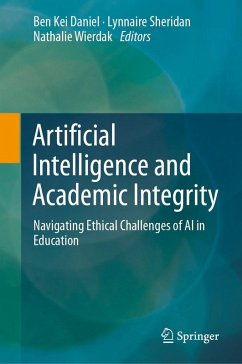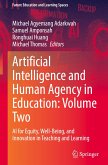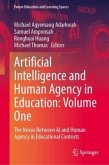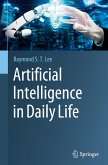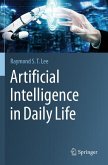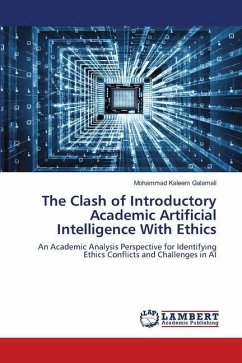Artificial Intelligence and Academic Integrity
Navigating Ethical Challenges of AI in Education
Herausgegeben:Daniel, Ben Kei; Sheridan, Lynnaire; Wierdak, Nathalie
Versandkostenfrei innerhalb Deutschlands
151,99 €
inkl. MwSt.
Versandkostenfrei*
Erscheint vorauss. 14. Februar 2026
Melden Sie sich
hier
hier
für den Produktalarm an, um über die Verfügbarkeit des Produkts informiert zu werden.

76 °P sammeln
Artificial Intelligence and Academic Integrity
Navigating Ethical Challenges of AI in Education
Herausgegeben:Daniel, Ben Kei; Sheridan, Lynnaire; Wierdak, Nathalie
- Gebundenes Buch
"This book brings together researchers and educators to explore the future of teaching and learning in the era of AI. Comprising seven sections, the volume includes philosophical reflections, historical analyses, empirical studies, and practical case-based insights. It also highlights the design and experimentation of AI technologies through proof-of-concept projects. Collectively, these contributions provide theoretical depth, strategic guidance, and evidence-informed approaches for navigating the benefits and risks of AI while upholding academic integrity in a rapidly changing educational…mehr
Andere Kunden interessierten sich auch für
![Artificial Intelligence and Human Agency in Education: Volume Two Artificial Intelligence and Human Agency in Education: Volume Two]() Artificial Intelligence and Human Agency in Education: Volume Two130,99 €
Artificial Intelligence and Human Agency in Education: Volume Two130,99 €![Artificial Intelligence and Human Agency in Education: Volume One Artificial Intelligence and Human Agency in Education: Volume One]() Artificial Intelligence and Human Agency in Education: Volume One123,99 €
Artificial Intelligence and Human Agency in Education: Volume One123,99 €![Cultivating Digital Skills for Global Relevance Cultivating Digital Skills for Global Relevance]() Cultivating Digital Skills for Global Relevance176,99 €
Cultivating Digital Skills for Global Relevance176,99 €![Artificial Intelligence in Daily Life Artificial Intelligence in Daily Life]() Raymond S. T. LeeArtificial Intelligence in Daily Life34,99 €
Raymond S. T. LeeArtificial Intelligence in Daily Life34,99 €![Artificial Intelligence for Human Fertility: Trends, Insights, and Predictions Artificial Intelligence for Human Fertility: Trends, Insights, and Predictions]() KC SantoshArtificial Intelligence for Human Fertility: Trends, Insights, and Predictions136,99 €
KC SantoshArtificial Intelligence for Human Fertility: Trends, Insights, and Predictions136,99 €![Artificial Intelligence in Daily Life Artificial Intelligence in Daily Life]() Raymond S. T. LeeArtificial Intelligence in Daily Life34,99 €
Raymond S. T. LeeArtificial Intelligence in Daily Life34,99 €![The Clash of Introductory Academic Artificial Intelligence With Ethics The Clash of Introductory Academic Artificial Intelligence With Ethics]() Mohammad Kaleem GalamaliThe Clash of Introductory Academic Artificial Intelligence With Ethics29,99 €
Mohammad Kaleem GalamaliThe Clash of Introductory Academic Artificial Intelligence With Ethics29,99 €-
-
-
"This book brings together researchers and educators to explore the future of teaching and learning in the era of AI. Comprising seven sections, the volume includes philosophical reflections, historical analyses, empirical studies, and practical case-based insights. It also highlights the design and experimentation of AI technologies through proof-of-concept projects. Collectively, these contributions provide theoretical depth, strategic guidance, and evidence-informed approaches for navigating the benefits and risks of AI while upholding academic integrity in a rapidly changing educational landscape.The book is aimed at a wide audience, including researchers, educators, instructional designers, policymakers, and higher education leaders who are addressing the ethical, pedagogical, and institutional challenges raised by AI. It is also valuable for postgraduate or graduate students and scholars in education, technology, and ethics, as well as for those supporting institutions in responding to emerging technologies in teaching and learning."
Produktdetails
- Produktdetails
- Verlag: Springer / Springer Nature Singapore / Springer, Berlin
- Artikelnr. des Verlages: 89269934, 978-981-95-1874-6
- Seitenzahl: 363
- Erscheinungstermin: 14. Februar 2026
- Englisch
- Abmessung: 235mm x 155mm
- ISBN-13: 9789819518746
- ISBN-10: 9819518741
- Artikelnr.: 75025280
- Herstellerkennzeichnung
- Springer-Verlag GmbH
- Tiergartenstr. 17
- 69121 Heidelberg
- ProductSafety@springernature.com
- Verlag: Springer / Springer Nature Singapore / Springer, Berlin
- Artikelnr. des Verlages: 89269934, 978-981-95-1874-6
- Seitenzahl: 363
- Erscheinungstermin: 14. Februar 2026
- Englisch
- Abmessung: 235mm x 155mm
- ISBN-13: 9789819518746
- ISBN-10: 9819518741
- Artikelnr.: 75025280
- Herstellerkennzeichnung
- Springer-Verlag GmbH
- Tiergartenstr. 17
- 69121 Heidelberg
- ProductSafety@springernature.com
Ben Kei Daniel, is Professor of Computer Science and Director of the Centre for Teaching, Learning and Technology at the University of Northern British Columbia, Canada. He holds a joint PhD in Educational Technology and Artificial Intelligence in Education (AIED). His research focuses on AI-driven advanced learning technologies and Research Methodologies. Ben is a Senior Member of the Institute of Electrical and Electronics Engineers (IEEE), and a member of the New Zealand Council for Educational Research (NZCER), the Council of Australasian University Leaders in Learning and Teaching (CAULLT), the Association for Computing Machinery (ACM), and the International Artificial Intelligence in Education Society (IAIED). Nathalie Wierdak, University of Otago, Dunedin, New Zealand Nathalie’s work centres on advancing equity, wellbeing, and inclusive education through collaborative, values-driven initiatives. Drawing on a background in anthropology, learning development, and community engagement, she explores how strategic communication and inclusive pedagogical design can support historically underserved learners. Her current projects focus on the ethical use of generative AI in tertiary education, strengthening transitions into university, and enhancing staff capabilities in learner-centred teaching. Nathalie’s applied research also spans stakeholder engagement, intercultural communication, and science outreach, with an emphasis on socially responsive, sustainable practices in Aotearoa and the wider Pacific. Lynnaire Sheridan, University of Otago, Dunedin, New Zealand Lynnaire's research focus is on identifying key insights and potential learnings emerging from complex scenarios to facilitate problem solving and promote positive socio-cultural ecological and economic outcomes. She applies this lens within higher education through her teaching and learning research, with a focus on work-integrated learning, academic integrity, equity, and the use of artificial intelligence. Within her discipline, she explores organisational issues across diverse contexts, including workplace health and safety, tourism, healthcare, and global migration.
"Chapter 1-Artificial Intelligence and Academic Integrity at a Crossroads".- "Chapter 2-(Academic) Integrity in the age of Artificial Intelligence".- "Chapter 3-How has ChatGPT been positioned as a threat to academic integrity? A scoping review".- "Chapter 4-Preparing Graduates for the Impact of Generative Artificial Intelli-gence in Future Work".- "Chapter 5-Artificial Intelligence Applied to Teaching in Brazilian Public Schools:Emerging Disruptive Pedagogical Theories in Convergence with New Education Ethical Postures".- "Chapter 6-Evaluating the potential for AI-enhanced communication to foster ter-tiary students' sense of belonging and academic engagement".- "Chapter 7-Strengthening authenticity and authorship in the age of AI: AVATAR, a reflective technology for authorial voice development".- "Chapter 8-The Values of Academic Integrity in the Era of Monitoring AI in Class-rooms".- "Chapter 9-Using AI LLMs in the class: the case of teaching business ethics".- "Chapter 10-Artificial intelligence for evaluating learning progress and teaching success: ChatGPT, a language model developed by OpenAI, case".- "Chapter 12-Employing Deep Neural Networks to Automate Grading of Short Answers in Networking Courses".- "Chapter 13-Impact of ChatGPT on Academic Achievement and Self-Efficacy of Postgraduate Students".- "Chapter 14-Navigating academic discourse socialisation challenges: Leveraging AI tools for academic writing among L2 doctoral students".- "Chapter 15-Understanding AI ethics through the student's eyes: A study of ChatGPT integration in a University German course".- "Chapter 16-The future of higher education in the era of generative AI".- "Chapter 17-Students experiences and perceptions of ethical use of AI tools".- "Chapter 18-ChatGPT for Learning: Students perspectives, Opportunities, Chal-lenges, and Academic Integrity Concerns".- "Chapter 19-When we have to use AI-Exploring AI-supported assessment tools in tertiary education".- "Chapter 20-Conclusion and future directions".
"Chapter 1-Artificial Intelligence and Academic Integrity at a Crossroads".- "Chapter 2-(Academic) Integrity in the age of Artificial Intelligence".- "Chapter 3-How has ChatGPT been positioned as a threat to academic integrity? A scoping review".- "Chapter 4-Preparing Graduates for the Impact of Generative Artificial Intelli-gence in Future Work".- "Chapter 5-Artificial Intelligence Applied to Teaching in Brazilian Public Schools:Emerging Disruptive Pedagogical Theories in Convergence with New Education Ethical Postures".- "Chapter 6-Evaluating the potential for AI-enhanced communication to foster ter-tiary students' sense of belonging and academic engagement".- "Chapter 7-Strengthening authenticity and authorship in the age of AI: AVATAR, a reflective technology for authorial voice development".- "Chapter 8-The Values of Academic Integrity in the Era of Monitoring AI in Class-rooms".- "Chapter 9-Using AI LLMs in the class: the case of teaching business ethics".- "Chapter 10-Artificial intelligence for evaluating learning progress and teaching success: ChatGPT, a language model developed by OpenAI, case".- "Chapter 12-Employing Deep Neural Networks to Automate Grading of Short Answers in Networking Courses".- "Chapter 13-Impact of ChatGPT on Academic Achievement and Self-Efficacy of Postgraduate Students".- "Chapter 14-Navigating academic discourse socialisation challenges: Leveraging AI tools for academic writing among L2 doctoral students".- "Chapter 15-Understanding AI ethics through the student's eyes: A study of ChatGPT integration in a University German course".- "Chapter 16-The future of higher education in the era of generative AI".- "Chapter 17-Students experiences and perceptions of ethical use of AI tools".- "Chapter 18-ChatGPT for Learning: Students perspectives, Opportunities, Chal-lenges, and Academic Integrity Concerns".- "Chapter 19-When we have to use AI-Exploring AI-supported assessment tools in tertiary education".- "Chapter 20-Conclusion and future directions".
